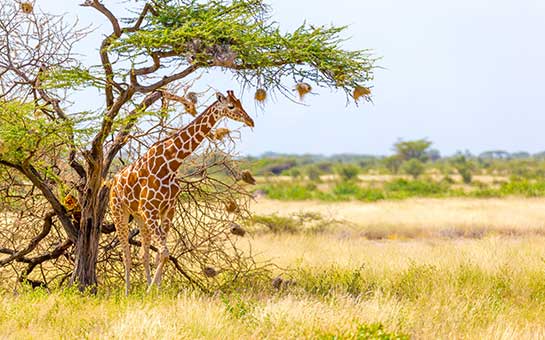Somalia is located in the Horn of Africa, and 85% of the people here are ethnic Somalis. In the ancient and medieval ages, it was believed to be a major commercial center in the fabled Land of Punt, and the region had close ties with Egypt.
Somalia had been colonized twice, once by the British and then the Italians. There were ongoing conflicts with the reigning Sultanates, and even today, Somalia is a very volatile country. Civil unrest is very common, and the militia is often engaged with border wars with its neighbors.
Nevertheless, Somalia is a great country to explore, as its largely homogenous population will allow you to explore traditional Somali life. Enjoy the traditional delicacies and go sightseeing for a very unique vacation. But, before you leave, it would be wise to purchase travel insurance as a safety net against any unexpected accidents, illnesses, or injuries.
Somalia Trip Cancellation Insurance for International Travelers – FAQs
With trip cancellation insurance, you might not have to face any financial losses if your trip or part of the bookings are canceled at the last moment.
Why buy trip cancellation insurance for Somalia?
Somalia trip cancellation insurance can help make sure your money doesn’t go to waste if your arrangements are canceled for a covered reason. Since civil unrest and terror activities occur frequently, such cancellations can happen at any time.
While such a cancellation will certainly ruin your travel plans, the insurance can safeguard your money, and you can be reimbursed for any prepaid, non-refundable expenses, as long as you canceled for a reason listed in your policy. Be sure to read the fine print.
What all is covered under trip cancellation insurance for Somalia?
Somalia trip cancellation Insurance can cover the following:
- Baggage theft
- Flight delay or cancellation
- Sightseeing cancellation
- Safari cancellation
- Hotel booking cancellation
- Car rental cancellations
Things to Do for Travelers in Somalia
Try these activities in Somalia for some amazing experiences.
- See the Laas Geel Cave Paintings: The Laas Geel caves are among the best-preserved Neolithic caves in the world, and there are talks of making them a UNESCO World Heritage Site. The cave paintings are sure to transport you back in time. Researchers come here from all over the world to have a look at the paintings to get an idea about prehistoric life.
- Safari at Kismayo National Park: This natural reserve is home to the very rare animal, the Hunter’s Hartebeest. Spotting them in their natural ambiance is a unique experience. There are several other animals like elephants, zebras, giraffes, and gazelles. The ecology sustains many varieties of birds and insects, as well.
- Explore the Old City of Mogadishu: Mogadishu is a popular tourist attraction, and the ruins provide great scope for photography. The city was once spectacularly fortified, and the crumbling walls stand to speak of its grand history. There are old mosques and tombs inside, and even a lighthouse. At one point, the wealthiest people in the country chose to live here.
- Relax on the Beach: The beaches in Somalia are a great spot for sunbathing. The coastline along the Indian Ocean also houses many coral reefs which you can see up close while scuba diving. There are also some ruins along the beaches, and along with the shimmering sand, they create a dreamlike vista.
- Exploring the Tombs of Hafun: If you want some thrill in your vacation, then head to the town of Hafun, which is the necropolis of Somalia. The town was once a trading port, but most come here today to explore the underground maze of tombs, creating a labyrinthine cemetery. The atmosphere is eerie and locals do not go near it after dark.
Travel Risks for International Travelers in Somalia
Somalia is considered a high-risk country because of the constant political turmoil it goes through. Here are some other things to watch out for.
- Extreme Weather: Somalia is a very dry country, and droughts are very common. This could lead to dehydration, and scarcity of water can lead to potential contamination of the little that is available. Yet, there are bouts of floods as well, which damage crops and buildings in turn create scarcity of food from time to time.
- Scams: Like in some other African countries, scams are pretty common in Somalia. The weak economic condition forces people into choosing unscrupulous ways of making money. Drivers will try to charge you more while traveling, and the locals will ask more money in the markets from the tourists. ATMs are often tampered with, as well.
- Illnesses: Overall, sanitation is a major concern in Somalia, so never have food from open, roadside shacks. Carry food and water from the hotel you are staying at. Food from dubious sources could lead to stomach disorders like diarrhea and cholera. Mosquito-borne diseases like malaria and dengue are also very common.
Before You Travel to Somalia - Do This
Plan your itinerary carefully so that you do not have to venture into areas prone to kidnappings. Prior knowledge of the roads and routes you will take will prevent you from wandering into isolated roads.
Always carry purification tablets or a water filter, as water is hardly treated outside the main city. Carry bug repellent spray and mosquito sprays as well.
Find out about banks in your vicinity so that you do not have to rely on unknown outlets to withdraw money.
Check the weather conditions and temperature of the areas you will be traveling to, and prepare yourself accordingly. Carry sunglasses, scarves, sunscreen, and enough water to avoid sunburn and dehydration.
Somalia can be a difficult country to travel through for novice travelers; get Somalia travel insurance, which can help cover your expenses if things go wrong. Compare a wide variety of options side by side, and pick the plan that best matches your itinerary, destination, and budget.
